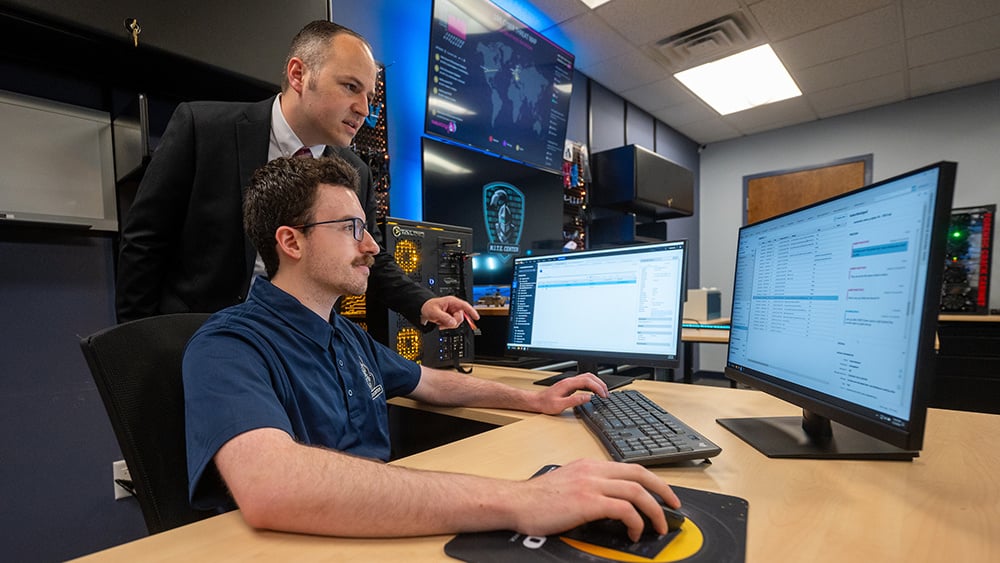
Breaking into the cybersecurity field means equipping yourself with the in-depth knowledge and skills required to meet the needs of an evolving digital landscape. To do this, you’ll need to choose a quality academic program that’s aligned with your professional goals and designed to set you up for success in competitive environments.
Choosing between a master's degree in cybersecurity and a cybersecurity bootcamp depends on your long-term career goals, current expertise level, and ideal learning style. Each educational path caters to different professional trajectories within the cybersecurity industry.
As a future leader in cybersecurity, it’s time to discern which educational option is right for you. Let’s dive into the essential qualifications needed for a successful career in today’s cyber industry and how a respected master’s degree in cybersecurity can help you achieve exactly that.
Discover the value of a master’s degree in cybersecurity.
Key Takeaways:
- Cybersecurity bootcamps offer quick, focused training for entry-level cybersecurity roles—ideal for filling skill gaps or transitioning careers.
- Master’s degrees in cybersecurity prepare professionals for advanced, strategic, and leadership positions.
- A cybersecurity master’s provides broader opportunities for career longevity, upward mobility, higher salaries, and specialized expertise.
- Many online cybersecurity degree programs offer flexibility for working professionals, with opportunities to earn credentials while gaining hands-on experience.
- Graduates with a cybersecurity master’s often see a high return on investment, securing roles with salaries exceeding $200,000/year, and benefitting from high job growth rates.
What You Need to Pursue a Cybersecurity Career Path
Entering cybersecurity requires a mix of technical skills, problem-solving abilities, and practical experience. Here’s what aspiring professionals should consider:
- Foundational knowledge: networking, systems administration, cloud basics, and programming fundamentals
- Certifications (optional but recommended): CompTIA+, CEH, CISSP for advanced roles
- Hands-on experience: labs, internships, or freelance projects help bridge the gap between theory and practice
While these elements are foundational to breaking into the field, it’s equally important to choose the right educational pathway based on your experience level and long-term goals.
- A cybersecurity bootcamp can provide fast, targeted training for entry-level roles or help you fill a specific skills gap.
- A cybersecurity master’s degree can strengthen your broader theoretical understanding, strategic thinking, and leadership capabilities, helping you advance your long-term career.
Both paths play a role depending on where you are in your career trajectory and what you hope to achieve.
Explore how Neumann’s online cybersecurity master’s can accelerate your career—get more information today.
Bootcamp vs. Master's in Cybersecurity
Let’s take a closer look at the curriculum depth, duration, educational experience, career development, and industry perceptions for both cybersecurity bootcamps and Master of Science in Cybersecurity programs.
|
Traditional Online |
||
|
Duration |
21 months |
Intensive programs lasting several weeks to a few months |
|
Curriculum |
Provides a broad range of skills and hands-on learning opportunities taught by industry experts. Coursework typically includes ethical hacking, penetration testing, risk management, cost analysis, container technologies, effective AI use, and compliance knowledge—offering far more depth than a short-format bootcamp. |
Offers a fast, focused dive into a specific skill area. Designed to help learners quickly qualify for particular technical competencies or fill targeted knowledge gaps. |
|
Faculty |
Courses are led by dedicated faculty with years of industry experience who actively teach and mentor. |
Often delivered through self-paced or lightly facilitated online platforms with limited or no direct faculty interaction and no formal accreditation or academic oversight. |
|
Career Outcomes |
Supports sustainable career development and prepares graduates for strategic, leadership-oriented cybersecurity roles with clear opportunities for upward mobility. |
Best suited for short-term career gains, helping learners obtain foundational credentials for entry-level cybersecurity roles. |
|
Industry Perception |
There is a growing emphasis on deeply understanding cybersecurity rather than only knowing how to implement specific tools or procedures. This distinction favors master's degree holders, as employers recognize the depth of knowledge and strategic thinking they bring to the table. |
While bootcamp graduates gain practical, actionable skills, these programs are often seen as offering limited breadth, particularly in areas that require critical thinking, strategy, and complex problem-solving. |
|
The Bottom Line |
A master's degree equips you with a broader, more strategic understanding of the field and positions you for advanced cybersecurity career opportunities and long-term professional growth. |
Bootcamps are a helpful short-term solution for entering the field or addressing a specific skills gap. They offer quick, targeted training but may not support long-term advancement on their own. |
From Silicon Valley to the Pentagon—explore lucrative cybersecurity career paths you can pursue with a master’s degree.
Choosing a Graduate Cybersecurity Degree Online
If you’ve determined that a master’s degree in cybersecurity more closely aligns with your goals than a cybersecurity bootcamp, the next decision is choosing the format that fits your lifestyle and learning needs. Traditional on-campus graduate programs remain a strong option, but many working professionals are turning to online cybersecurity master’s degrees for their flexibility and accessibility.
A well-designed online program allows you to balance your coursework with full-time work and personal commitments—without sacrificing academic rigor. Look for programs that offer hands-on learning opportunities, such as virtual lab simulations, scenario-based exercises, or structured experiential learning components. These experiences help you build the practical skills employers expect while maintaining the freedom of a fully online format.
Choosing an online graduate cybersecurity degree ultimately gives you the ability to develop advanced, career-ready skills on your own schedule, making it an ideal option for professionals who want to grow in the field without stepping away from their current role.
→ Pro Tip: Graduate school is an investment; learn how to offset its costs in our Financial Aid Guide.
FAQ About Getting Into Cybersecurity
Is cybersecurity a good career?
Yes. With high demand, competitive salaries, and a projected 33% job growth, cybersecurity is a promising career path.
Is it possible to get into cybersecurity with no experience or degree?
Possibly, but for long-term career growth, a master’s degree in cybersecurity is the most strategic path forward.
How long does it take to get into cybersecurity?
A master’s degree in cybersecurity typically takes 1–2 years and positions you for sustainable, high-level career growth.
Is a cybersecurity bootcamp worth it?
Cybersecurity bootcamps are great for gaining practical skills quickly, but they may not provide the depth or long-term career growth of a master’s degree.
Do employers prefer cybersecurity degrees or certifications?
While certifications demonstrate practical skills, employers increasingly value the advanced knowledge, strategic thinking, and leadership preparation that a cybersecurity master’s degree provides.
What can you do with a master’s degree in cybersecurity?
A master’s degree prepares you for advanced roles, including security analyst, penetration tester, cybersecurity manager, and leadership positions, giving you opportunities for higher pay and career advancement.
The Best Cybersecurity Bootcamp Isn’t a Bootcamp at All: Neumann’s Online Master’s in Cybersecurity
Neumann University offers a respected Master of Science in Cybersecurity, that is specifically designed for driven, competitive individuals who want to become indispensable members of a cybersecurity team.
With expert faculty who have on-the-ground industry experience, opportunities for hands-on learning via hacking lab simulations, and a 100 percent online completion model, we produce qualified, sought-after cybersecurity professionals who go on to experience meaningful, lucrative careers in the field.
Master of Science in Cybersecurity:
|
Average Salary 214,000 |
Job Growth Rate 33% |
If you’re ready to transform your career with Neumann’s graduate cybersecurity degree online, then you’re in the right place. We encourage you to request more information or schedule a one-on-one conversation with our MS in Cybersecurity admissions counselor.
You can also review our admissions requirements or start your online application today.
 CHALLENGE
CHALLENGE











